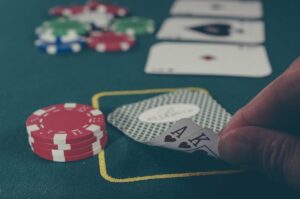The legality of daily fantasy sports sites in the state of Illinois has been a major point of contention for the last four years. The Illinois Supreme Court made its final ruling on April 16, and it appears to be a monumental ruling for DFS operators. Similar arguments have taken place in other states over the last few years, but a legal case in Illinois made it an even bigger issue.
This battle started in April 2016 when two Illinois residents, Colin Dew-Becker and Andrew Wu, each entered into a fantasy sports contest. The contest took place on FanDuel, which is one of the leading daily fantasy sports operators in the world. Dew-Becker and Wu were competing in a head-to-head matchup surrounding NBA basketball.
Both parties paid a total of $109, with $100 being the entry fee into the contest and the other $9 going to FanDuel. Wu was the winner of the contest, but then three days later, Dew-Becker sought to recover his bet. Dew-Becker turned to The Loss Recovery Act to retain his money.
The Loss Recovery Act was put in place back in 1819 and serves as a way for someone to recover money as a part of an illegal wager. By invoking this act, Dew-Becker was claiming that FanDuel contests are a form of gaming, and all forms of sports gambling were illegal in Illinois at the time.
What followed was an intense legal battle that lasted over four years, with the Supreme Court in Illinois eventually being forced to determine if daily fantasy sports sites are a form of illegal gambling.
Long-Awaited Ruling
Nearly four years after the Loss Recovery Act was invoked by Dew-Becker, the Illinois Supreme Court finally came down with a ruling. The court ruled that fantasy sports are a game of skill as opposed to a game of luck, and therefore are not a form of illegal gambling.
This ruling means that DFS sites such as DraftKings and FanDuel are not considered online gambling sites, and all of the wagers made on these sites are legal. Chief Justice Ann Burke disclosed the final ruling that was only opposed by Justice Lloyd Karmeier.
The final decision issued by the Illinois Supreme Court means that Wu is able to keep his winnings from Dew-Becker for this contest, but it also has a much bigger meaning for daily fantasy sports in Illinois. The Supreme Court determined that contests such as the one that these two men participated in do not fall under the umbrella of illegal gambling.
The court did disclose that lawmakers in Illinois do have the right to create laws as a way to regulate the daily fantasy sports industry. Several states have come up with similar rulings over the last few years, and some states have turned to legalizing the industry.
Illinois does not appear to be one of the states set to legalize daily fantasy sports, as the state has been in a major battle with both DraftKings and FanDuel. State lawmakers accused both sites of illegally operating in the state of Illinois and even sued the two companies to shut down business with Illinois residents.
Since that lawsuit, Illinois has legalized online sports betting throughout the state, but they have put both FanDuel and DraftKings in the “penalty box.” These two sites cannot apply for a mobile sports betting license until at least 18 months after the industry has launched. Sports betting launched in Illinois on March 9 but has since been shut down due to the coronavirus pandemic.




